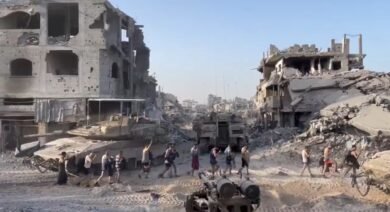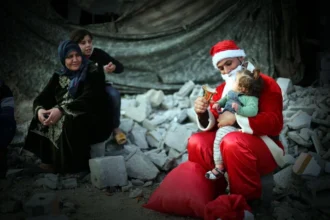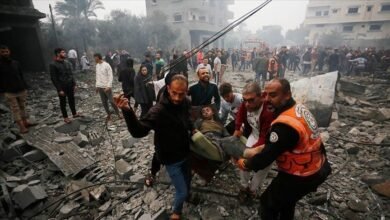
On World Environment Day… ICSPR warns of systematic environmental genocide in the Gaza Strip threatening life and resources
Date: June 8, 2025
Press Release
On World Environment Day… ICSPR warns of systematic environmental genocide in the Gaza Strip threatening life and resources
Coinciding with World Environment Day, the International Commission to Support Palestinian Rights (ICSPR) addressed an urgent briefing memorandum to a number of international and regional bodies, warning of the worsening environmental catastrophe in the Gaza Strip as a result of the Israeli aggression that has continued for more than 18 months, and the comprehensive blockade imposed for 17 years. The Commission considered that what the Strip is being subjected to is a comprehensive environmental genocide, which cannot be described as mere collateral war damage, but rather amounts to a fully-fledged environmental war crime.
While the world celebrates this year’s World Environment Day under the slogan “Beat Plastic Pollution,” Gaza is experiencing a catastrophic environmental reality that threatens life and strikes at all components of the natural environment — water, soil, and air — due to extensive Israeli military operations that have spared no facility or environmental element from being targeted.
Reports issued by the Environmental Quality Authority and the Palestinian Central Bureau of Statistics indicate that 65% of Gaza’s residents receive only 3 to 5 liters of water per person per day, a very low rate according to international standards. Water prices in the Strip have also risen by more than 400%, due to the destruction of more than 85% of water and sewage networks and nearly 80% of pumping and treatment stations. Meanwhile, 91% of households are now suffering from water insecurity, exposing residents to serious illnesses, most notably severe diarrhea and poisoning.
The Commission explained that waste and rubble pose an additional environmental threat, with the volume of accumulated solid waste and rubble in the Gaza Strip estimated at more than 50 million tons, while about half a million tons of household and medical waste are piling up in the streets without treatment. At the same time, the aggression has led to the destruction of more than 81% of agricultural lands, exacerbating the food security crisis and reducing the population’s ability to access healthy and safe food.
One of the most dangerous dimensions documented by the Commission is the Israeli occupation’s use of internationally banned weapons, including white phosphorus and depleted uranium, which has caused contamination of air, water, and soil with toxic and radioactive substances, whose environmental and health effects may last for decades. The destruction of treatment plants has also led to large quantities of untreated sewage leaking into the sea, polluting more than 50% of Gaza’s coastline and causing the extinction of multiple marine species.
ICSPR confirmed that these crimes constitute a blatant violation of a number of relevant international conventions and treaties, including the Geneva Conventions of 1949, the Ramsar Convention on Wetlands of 1971, and the Stockholm Convention on Persistent Organic Pollutants of 2001 — requiring urgent legal intervention and international accountability.
In conclusion of its memorandum, the Commission called on the international community to take urgent action, including halting the aggression, lifting the blockade, and allowing the entry of environmental and humanitarian aid and equipment necessary to rehabilitate the destruction caused by the war. It also called for the environmental disaster in Gaza to be included in the priorities of the international system, to open a comprehensive investigation into environmental crimes before the International Criminal Court, in addition to supporting community initiatives and popular environmental monitoring, and systematically documenting the environmental violations occurring in Gaza.
The memorandum was officially sent to a group of influential international bodies, including:
The Secretary-General of the United Nations, the United Nations Environment Programme (UNEP), the UN Special Rapporteur on human rights and the environment, the Office of the High Commissioner for Human Rights, the Prosecutor of the International Criminal Court, the European Commission for Environment and Climate, the Environmental Crimes Unit at the International Criminal Court, the Inter-Parliamentary Union, the African Union, and the Council of Arab Ministers Responsible for the Environment at the League of Arab States.
In a press statement, Dr. Salah Abdel Ati, Chairman of the Commission, said:
“We are facing an environmental genocide occurring in utter silence. The Gaza Strip is being environmentally exterminated, and this crime is unforgivable. What is needed is not symbolic solidarity, but urgent action to restore the Palestinian environment’s right to life and the Palestinian people’s right to justice.”





